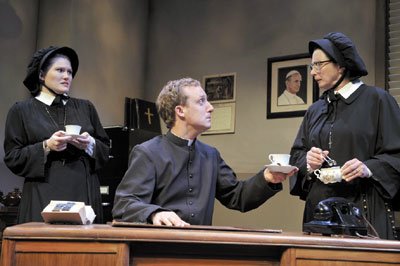We begin as a congregation at a Catholic church listening to the
Sunday sermon being given by a young, good-looking, effervescent
priest.
We begin as a congregation at a Catholic church listening to the Sunday sermon being given by a young, good-looking, effervescent priest.
He is warm, charming and approachable. His sermon is simple and easy to understand. He asks, “What do you do if you are not sure?” You feel warm and safe with his answers. Scene shifts to the sparse office of the principal of the adjoining Catholic school.
Sister Aloysius is ridged, stoic and mentally cemented to her thoughts and ideas. She is of the old school: terrify the students to make better students. She becomes suspicious the well-liked, dedicated priest is abusing one of the students.
She is obsessed with the possibility and follows the idea with the vengeance of a bulldog with locked jaws on prey. Considering the truth is a labyrinth of twists and turns and doubts mingled with complicated issues, she presses forward to have the priest removed from the position and the church he loves. The outcome is timely and leaves the audience members to make up their own mind.
Beautifully written by prolific playwright John Patrick Shanley, “Doubt” won the Pulitzer Prize for drama in 2005 and a Tony Award for best play that same year. When it moved to Broadway from off-Broadway, it played for 525 performances and became the fifth longest-running play on Broadway in 10 years.
Shanley has directed the film adaptation of “Doubt,” which will be released this fall starring Meryl Streep. He also won an Academy Award for best original screenplay for “Moonstruck.”
Vickie Rozell and Robert Kelly directed this gem with tenderness and the delicate touch they are known for.
They delve deep into the four characters and create a forum for the audience to become a piece of the puzzle. As a part of this experience, one becomes a part of each character and reacts to the plot as each of us would in our own lives. Are our convictions valid or are our doubts so strong they may blind us to the truth?
Casting – as usual with a TheatreWorks production – is fine-tuned. There are four featured players: Cassidy Brown as Father Brendan Flynn, Kimberly King as Sister Aloysius Beauvier, Kristin Stokes as Sister James and Tamiyka White as Mrs. Muller. All are equally fine actors and give meticulous performances.
In Act 1, Shanley tells us “Doubt can be a bond as powerful and sustaining as certainty.” Something to think about. This is extremely powerful theatre, beautifully presented and offered with the usual panache of TheatreWorks.
Camille Bounds is the Theater and Arts Editor for Sunrise Publications.











